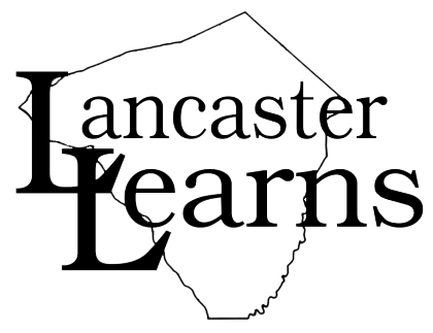2020 Keynote Speaker
EVENT LOCATION
Pennsylvania College of Health Sciences
850 Greenfield Road
Lancaster, PA 17601
Download the Campus Map
Download the Floor Plan
Keynote Speaker Location:
Cooper Building - High Auditorium
Breakout Sessions Location:
Cooper Building - Classrooms
Pennsylvania College of Health Sciences
850 Greenfield Road
Lancaster, PA 17601
Download the Campus Map
Download the Floor Plan
Keynote Speaker Location:
Cooper Building - High Auditorium
Breakout Sessions Location:
Cooper Building - Classrooms
Why should you attend Lancaster Learns? Hear from your peers on why they attend:
2020 Conference Date: February 28th
Registration Fee - $60
The registration fee includes the entire day's program, continental breakfast, lunch, and snacks.
The registration fee includes the entire day's program, continental breakfast, lunch, and snacks.
We look forward to the 2020 Lancaster Learns conference on Friday, February 28th. Save the date!
We are now accepting proposals for 45 minute sessions. Proposed sessions should present your research, ideas on teaching and learning, or other practical strategies that you want to share with colleagues. Sessions may also be panel discussions that involve multiple presenters.
Levels of Sponsorship:
Red Rose Sponsor - $100
Sponsors at the Red Rose level will have a table at the event.
Conestoga Sponsor - $500
Sponsors at the Conestoga Level will have a table at the event and signage as sponsor of the snacks.
Central Market Sponsor - $1000
Sponsors at the Central Market Level will have a table at the event and signage as sponsor of the breakfast or lunch.
Registration and payment for this event is being managed by the Elizabethtown College Event Center.
Red Rose Sponsor - $100
Sponsors at the Red Rose level will have a table at the event.
Conestoga Sponsor - $500
Sponsors at the Conestoga Level will have a table at the event and signage as sponsor of the snacks.
Central Market Sponsor - $1000
Sponsors at the Central Market Level will have a table at the event and signage as sponsor of the breakfast or lunch.
Registration and payment for this event is being managed by the Elizabethtown College Event Center.
Conference Evaluation
Please take a moment to provide feedback on this year's conference:
Evaluation Form
GET THE MOBILE APP!
Lancaster Learns now has a mobile app for iOS, Android, and the web.
Click HERE to have the download link sent to your device via text message or download the Guidebook app from your app store and search for Lancaster Learns.
Lancaster Learns now has a mobile app for iOS, Android, and the web.
Click HERE to have the download link sent to your device via text message or download the Guidebook app from your app store and search for Lancaster Learns.
SCHEDULE COMING SOON
2018 Program Schedule
8:15am - Arrival and continental breakfast (Auditorium Lobby)
8:45am - Keynote: Sarah Rose Cavanaugh (Auditorium)
The Spark of Learning: Energizing the College Classroom with the Science of Emotion
10:00am - Breakout Sessions
11:00am - Breakout Sessions
12:00pm - Lunch (Atrium)
1:15pm - Keynote: Remi Kalir (Auditorium)
Open, Critical, Participatory: New Directions in Digital Pedagogy
2:30pm - Breakout Sessions
3:30pm - Final Breakout Sessions
Download the Full Program
Download the Breakout Session Abstracts
Download the Floor Plan
Download the Campus Map
8:45am - Keynote: Sarah Rose Cavanaugh (Auditorium)
The Spark of Learning: Energizing the College Classroom with the Science of Emotion
10:00am - Breakout Sessions
11:00am - Breakout Sessions
12:00pm - Lunch (Atrium)
1:15pm - Keynote: Remi Kalir (Auditorium)
Open, Critical, Participatory: New Directions in Digital Pedagogy
2:30pm - Breakout Sessions
3:30pm - Final Breakout Sessions
Download the Full Program
Download the Breakout Session Abstracts
Download the Floor Plan
Download the Campus Map

Media Literacy
Julie Smith, M.S.
Julie has been teaching media literacy and media-related classes at the university level since 1997. She holds her B.A. in Public Relations from the University of Tulsa and her M.S. in Mass Communication from Southern Illinois University – Edwardsville. Julie is currently on the faculty at Webster University in St Louis.
She is the author of “Master the Media: How Teaching Media Literacy Can Save Our Plugged-In World” and over the last three years has traveled all over the U.S and Europe helping teachers and parents with media literacy, digital citizenship, classroom engagement and social media. Julie is currently working on a book advocating for more engagement in the college classroom.
Julie is on the Leadership Council of the National Association for Media Literacy and the Executive Board for the Gateway Media Literacy Project.
Julie Smith, M.S.
Julie has been teaching media literacy and media-related classes at the university level since 1997. She holds her B.A. in Public Relations from the University of Tulsa and her M.S. in Mass Communication from Southern Illinois University – Edwardsville. Julie is currently on the faculty at Webster University in St Louis.
She is the author of “Master the Media: How Teaching Media Literacy Can Save Our Plugged-In World” and over the last three years has traveled all over the U.S and Europe helping teachers and parents with media literacy, digital citizenship, classroom engagement and social media. Julie is currently working on a book advocating for more engagement in the college classroom.
Julie is on the Leadership Council of the National Association for Media Literacy and the Executive Board for the Gateway Media Literacy Project.

Open, Critical, Participatory: New Directions in Digital Pedagogy
Remi Kalir, Ph.D.
Assistant Professor of Information and Learning Technologies at the University of Colorado Denver School of Education and Human Development. His recent research includes: Playful Annotation with Hypothesis Studying Interactive Text, and Learning, Enacting, and Designing Techquity.
Session Description:
Digital media practices present both novel and challenging opportunities for faculty to support open, critical, and participatory learning. This presentation will explore the intersection of critical education and digital pedagogy, introduce tools and perspectives that encourage critical digital pedagogy, and suggest pathways toward designing and facilitating more open, equitable, and transformative learning.
Remi Kalir, Ph.D.
Assistant Professor of Information and Learning Technologies at the University of Colorado Denver School of Education and Human Development. His recent research includes: Playful Annotation with Hypothesis Studying Interactive Text, and Learning, Enacting, and Designing Techquity.
Session Description:
Digital media practices present both novel and challenging opportunities for faculty to support open, critical, and participatory learning. This presentation will explore the intersection of critical education and digital pedagogy, introduce tools and perspectives that encourage critical digital pedagogy, and suggest pathways toward designing and facilitating more open, equitable, and transformative learning.

The Spark of Learning: Energizing the College Classroom with the Science of Emotion
Sarah Rose Cavanaugh, Ph.D.
Associate Director of Assumption College’s Center for Teaching Excellence and author of “The Spark of Learning: Energizing the College Classroom with the Science of Emotion.”
Session Description:
Traditional views of education assume that reason should reign over emotion, and that the classroom should be a quiet, dispassionate space where students and instructors impartially engage with facts, figures and theories. However, the field of education is beginning to awaken to the power of emotions to capture attention, mobilize efforts, and enhance memory.
In this keynote address and interactive workshop, Cavanaugh will bring to bear a wide range of evidence from the study of education, psychology, and neuroscience to suggest that targeting emotions in your presentation style, course design, and assignments is a highly potent teaching strategy.
Sarah Rose Cavanaugh, Ph.D.
Associate Director of Assumption College’s Center for Teaching Excellence and author of “The Spark of Learning: Energizing the College Classroom with the Science of Emotion.”
Session Description:
Traditional views of education assume that reason should reign over emotion, and that the classroom should be a quiet, dispassionate space where students and instructors impartially engage with facts, figures and theories. However, the field of education is beginning to awaken to the power of emotions to capture attention, mobilize efforts, and enhance memory.
In this keynote address and interactive workshop, Cavanaugh will bring to bear a wide range of evidence from the study of education, psychology, and neuroscience to suggest that targeting emotions in your presentation style, course design, and assignments is a highly potent teaching strategy.
Save the date for next year's Lancaster Learns Conference!
2020 Date & Location to be announced
2020 Date & Location to be announced

